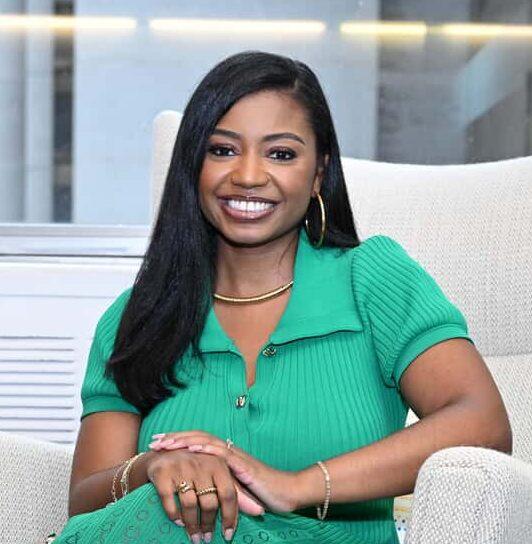All The Mic Drop Moments From The 4th Annual Women’s Leadership Forum Presented By AppNexus
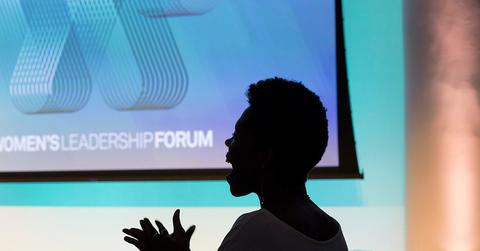
As 2018 comes to a close, we’re existing in a time when it feels as if the attack on women has reached an all time high. But within the battle towards creating a more equal and just world we’re sometimes sent a sign or glimmer of hope to keep marching on. This sign arrived on October 11th on the day dubbed International Day of the Girl when Appnexus hosted their 4th annual Women’s Leadership Forum.
We couldn’t think of a better place to be to restore, and refresh our optimism and vision for the future. The focus of the conversations were divided into three parts, making movements matter, exploring and being proactive about embracing our differences, and ultimately leading together.
A few themes emerged around turning emotions and rage into action, a reminder that diversity isn’t just a buzzword and several other mic drop worthy powerful moments.
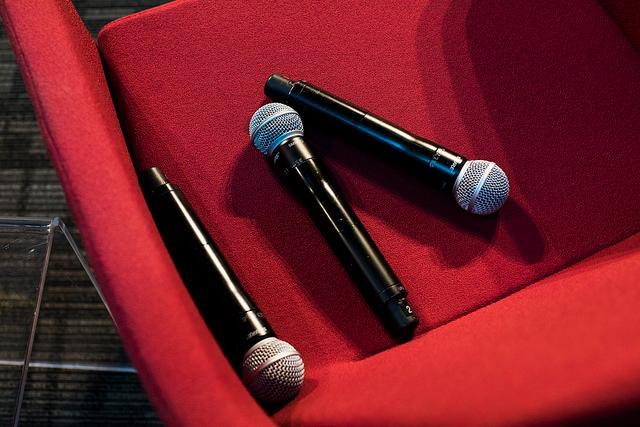
Below, get a peek inside our notebook with all the highlights and mic drop moments from this incredible day.
1. “No civil liberties battle ever remains won.” –President of the American Civil Liberties Union Susan N. Herman
There’s more work to be done. President of the American Civil Liberties Union Susan N. Herman set the tone and energy for action towards achieving gender justice by eloquently laying out the timeline and sequence of events as well as the power players involved in getting us to where we are now. Then, she delved into what we can do ourselves, and how to activate our communities around us. She started with the money, followed by job placement/job opportunities and finally focused on sexual harassment.
Through multiple points of litigation including Lilly Ledbetter and the Fair Pay Act of 2009 equal pay is still not a reality for women. In continuing to fight this battle, the ACLU is advocating for a Paycheck Fairness Act, in addition to a federal law prohibiting employers from asking about salary history (which is a law that exists on a state level in select states in the U.S.).
“Maybe you should pay people on the basis of what they’re worth in this job, as opposed to what their employer was paying on the last job,” Herman added with a roaring round of cheers and claps. She dove into the biases of algorithms with search engines and job placement websites. And gave us an outline of tools and steps to take when it comes to battling sexual harassment. One tool she mentioned, Betterbrave.org. The takeaway? If you’re not part of the solution you’re part of the problem. We need to continue to educate, network, say something and document as we work toward a more equal and just world for women and men.
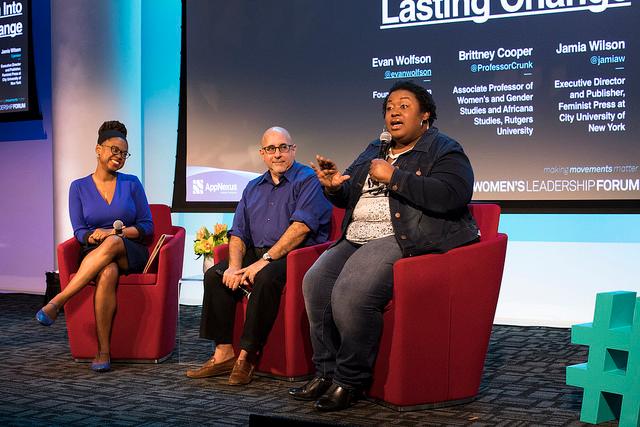
Can rage be a superpower? According to Associate Professor of Women’s and Gender Studies and Africana Studies, Rutgers University Brittany Cooper, the answer is YES (in all caps YES). “We should be able to bring our emotions into the workplace. It’s actual very male-centric patriarchal mindset that our emotions diminish our skillset and our ability [to do our job],” explains Cooper during a lively panel discussion titled Making Movements Matter: How to Turn Action Into Lasting Change. Joining her on stage included Evan Wolfson, Founder, Freedom to Marry and moderator Jamia Wilson who is a known movement builder and storyteller.
The discussion focused on actionable ways to channel all the emotions we feel in this critical time to fuel our next steps (and clear examples of what those next steps could be.)
“I wanna be very clear I’m angry as hell. I am deeply devastated by the appointment of Kavanaugh to the Supreme Court. I know what these kinds of appointments mean for women, people of color, gay folks. I make the argument, that my work got better the moment I was able to own my rage. If you are a person who is a champion for diversity in the workplace, your rage and your devastation over the political moment can power your commitment and your priority to making sure your workplace doesn’t induce trauma for people who help you to reach your bottom line.”
Mic drop moment number 111, and mind you we are only in the first part of the day, and the very beginning of this nuanced and necessary discussion. Adding onto Cooper’s perspective of channeling rage into action, Evan Wolfson brings other emotions into the conversation along with a different perspective on ways to be proactive toward creating change.
“I like to think of passion is the thing we want to tap into and turn into action for change. One of the Most effective ways of creating change is to tap into hope and sense of possibility. The clarity of goals, strategy and pathway to sustain your energy, passion, rage, shock, horror—and vision of where you want to go. And not be immobilized or be isolated by your rage,” Wolfson explained.
He goes on to add, “don’t wallow in that energy. Turn your passion [and] emotion into action—I think it’s the best way to bring the most people along with us. In order to achieve change it’s not enough to stand on your own. You have to bring in others. The way to bring in others—who are the critical mass who can be moved – the people that can be moved but haven’t been moved yet?”
Cooper then goes on to defend and further explain her choice of using the word rage explaining that at the heart of rage is fear and deep feeling of unsafety. And it’s not your workplace’s responsibility to coddle us, that’s what therapy is for but there should be a space created for radical empathy.
“We have to stop regulating appropriate what people are allowed to feel. I feel hope alongside my rage, I feel a deep and abiding passion alongside my rage, I feel a sense of clarity and purpose alongside my rage. If you’re not angry that’s cool. But if you are a woman in this moment, and you know we are facing the possibility of having women’s rights rolled back, you’re a Black person or a person of color or an immigrant person in this moment there’s no way that you can’t in some way be angry. It is about trying to hold all of these things together.”
Mic drop moment, again brought to you by the one and only Cooper. She further goes on to explain why she pushed back on Wolfson’s points re: hope and passion. “We can’t gloss over negative emotions to get to hope and passion. Sit with your discomfort – if you are ally, what is the woman next to you risking when nobody backs her play. When you see a woman in the boardroom who takes the risk, amplify what she said.”
And a final takeaway from Cooper, “I always want women to know that you should trust yourself. Trust your intuition. When you have a negative voice in your head, don’t listen to that b*tch, she’s a lie. And get you a crew. And be intentional about that. Reject the narrative about competing with other women to make it. Because in my crew we’re all stars.”
Oh and to white women, “here are a couple of words you should increase your literacy around if you haven’t already intersectionality, empathy and empathy gap, what does diversity really mean? Intersectionality and diversity aren’t the same thing.”
“Figure out the stuff you can say and you can do that will benefit you and others, and if all you can bring is that you’re going to show up every day and be excellent because you know that you doing it benefit you and makes pathways for others that is part of this movement and it matters and it counts so do that.” –Brittany Cooper
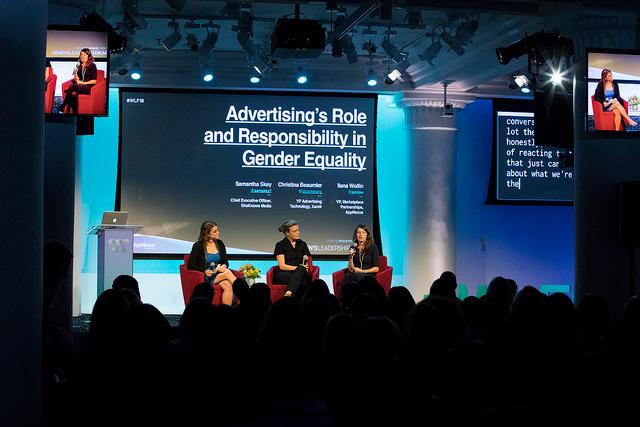
Continuing the conversation on turning actions into movement the next panel focused on advertising. Why? Samantha Skey CEO of SheKnows Media points out “stereotypes are perpetuated by advertising (which are 70 percent of our airwaves).” Any messaging taking up 70 percent of our airwaves is worth focusing on. Joining Skey in this conversation titled “Advertising’s Role and Responsibility in Gender Equality” was Christina Beaumier, VP Advertising Technology, AT&T Advertising and Analytics alongside Ilana Wollin, VP, Marketplace Partnerships, AppNexus.
“If you claim to support women—how do you do that everywhere from from your ads, to your board, to where you’re running your advertising? One way to change your behavior is by making it public. It holds you accountable. It’s easy to move away from that commitment if it’s not bottom line positive. We made a commitment to have 40% of our speakers on stage be women of color. I put that out there so people can call us out if we [don’t honor that commitment],” shared Skey.
The interesting thing however about ads and it’s dominance was pointed out by Beaumier, who said “At Xander, our purpose is to make advertising matter. Because people love brands but hate ads.” Beaumier credits a colleague for the language around the second portion of that statement.
Gaining the vocabulary to have these conversations. Arming ourselves and educating ourselves with the literacy. We need to acknowledge emotions like fear and figure out how to work through it.
“There is a value exchange that happens when people consume advertising. The [audience gets new awareness or information] and the publisher gets paid for ads – that should be a positive relationship.” Beaumier went on to explain. She highlights that AT&T partners with #SeeHer to create a playbook for all AT&T’s ads. The purpose is to ensures the biases that could be portrayed in their advertising are addressed. According to her, It ends up with better results. And the ads get better numbers better outcomes overall.”
“Inclusivity is not just enough, exclude people who do not represent your values. Weed out people who don’t fit. We need to call attention to the responsibility brands have for the messages they put into the world… and audit their backend representation on boards, within the company,” Skey adds.
And last but not least Skey brings the discussion home with the importance of having constructive tough dialogue behind closed doors in the decision making rooms. “Keep the conversation going… when I say something [about a topic] that one of my colleagues has spent more time thinking about, she can tell me ‘this is what you’re missing,’ instead of shutting me down, and saying ‘I’m not going to talk to you anymore.’ [We need to] be okay with aggressive debate. Have that debate in your creative rooms. In your media planning rooms.”
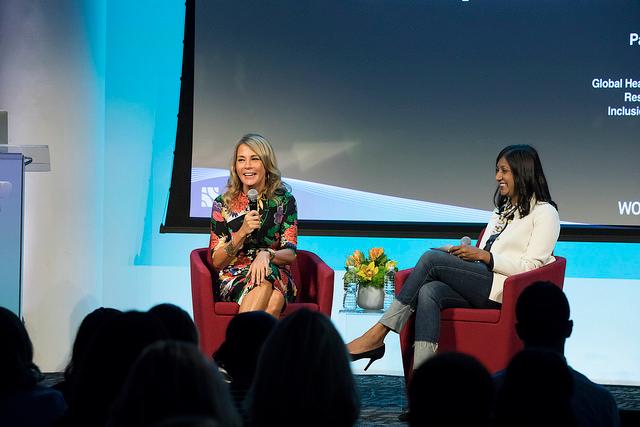
Nithya Das, Chief People and Legal Officer, AppNexus hits the nail on the head opening this discussion with, “Employees want to work for companies that care about things that are happening to employees outside of the workplace.” Joining Das in this conversation titled The Blurred Line Between Social Movements and Workplace Movements was Patsy Doerr, Global Head, Corporate Responsibility, Sustainability & Inclusion, Thomson Reuters.
On setting the stage on one of the reasons why this is important for companies to pay attention to, Doerr points to the statistic that “8 out of 10 millennials make their decision on companies they are going to work for based on how serious that company is about social impact.”
“Diversity and Inclusion is no longer an internal exercise. We need to be building environments and cultures where inclusion is allowed and expected. And that means we can have those conversations. At Thomson Reuters one of the premises of our strategy is very much finding that balance between diversity (bringing on diverse talent) and inclusion, which is having a culture that supports it. If the culture doesn’t support it, it’s never going to work.”
The discussion then moved to the importance of having courageous conversations, a dialogue in which Doerr says her firm takes on head on engaging in conversations at all levels including clients, partner and NGO’s in order to tap into “the power of the collective how to address these issues together.”
“The journalists are a part of our conversations – so we have to be objective – and we have be careful about not taking a partisan view. It does makes it more difficult to encourage those conversations on a broader scale. What we are doing is bringing together people who may be in pain and creating space to have these conversations,” explained Doerr.
Lastly was a portion diving into the power of establishing a business case around these topics.
“When I started at Reuters seven years ago, there were pockets of activities but there wasn’t a global strategy to pull it all together. We started with the business case. Years ago these topics were seen as soft issues – so the key is to prove the case that there nothing is soft about these issues at all. There is so much research where you can see the direct impact on employee engagement productivity, innovation and and ultimately the bottom line. So to be able to create a narrative that takes those compelling stats in a way that makes sense to your business leaders is a 100% place to start.”
In proving the business case behind these issues Doerr notes that the conversation has changed so it’s no longer a debate or dialogue to prove why these issues are important and moves it straight towards how do we do this and and measure its success over time.
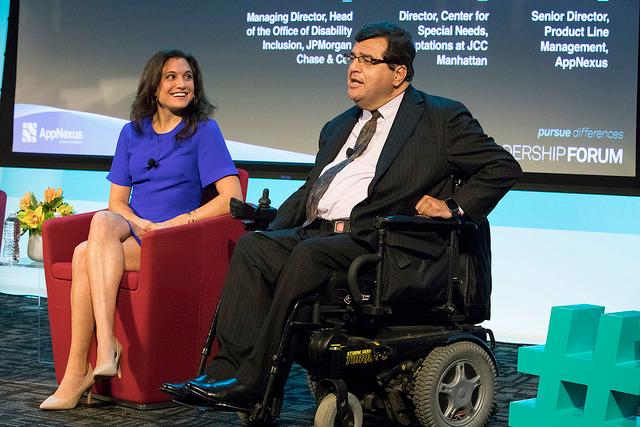
During this discussion, we were made aware that there are 40 million Americans (over 10 percent of the population) living with a prescribed disability. So it’s important to remember accommodations and access for people with disabilities when discussing the topic of diversity and inclusion. In the discussion titled “Different Abilities Mean Different Outcomes: Changing Perceptions Around Disability in the Workplace” Jim Sinocchi, Managing Director, Head of the Office of Disability Inclusion, JPMorgan Chase & Co. joined Allison Kleinman, Director of the Center for Special Needs and Adaptations, JCC Manhattan and Lindsay Van Kirk, Senior Director, Product Line Management, AppNexus to dive into these issues that are typically an afterthought.
“People ask me, Jim, what do I say when I meet a person with a disability. And I say… how about hello?” shared Sinnochi. Having space for these conversations helps to collectively create norms around people who are seen as different but have the same motivations, desires and dreams to live out their purpose and be productive members of society.
“Assimilation doesn’t mean we want you to look like everyone else. It means there’s a culture that affords people to be who they are and go from the mailroom to the boardroom.” Jim Sinocchi, eloquently puts it.
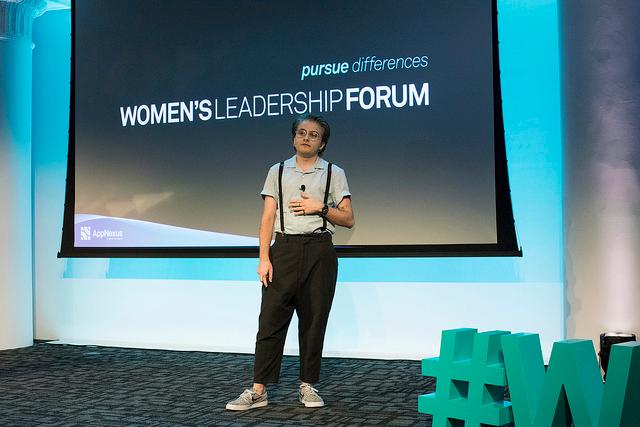
In a mid-day keynote titled Beyond Man & Woman: A Look at Nonbinary Identities and Experiences, Owen Meehan, Sales Supervisor, Warby Parker sheds light on broader ways to look at the concept of gender and dives into the definition of nonbinary. One important takeaway to note is the idea of gender being cultural rather than biological and they highlight 14 different cultures with more than two genders.
“Gender is a cultural system – we all as individuals and as collective have power over it. We can change it, we can define it for ourselves. On the individual level, I challenge you to examine your gender. What do you like about it? What [about it] limits you? How can you take your manhood or womanhood to empower yourself instead of making it into something that others use to [define you?]”
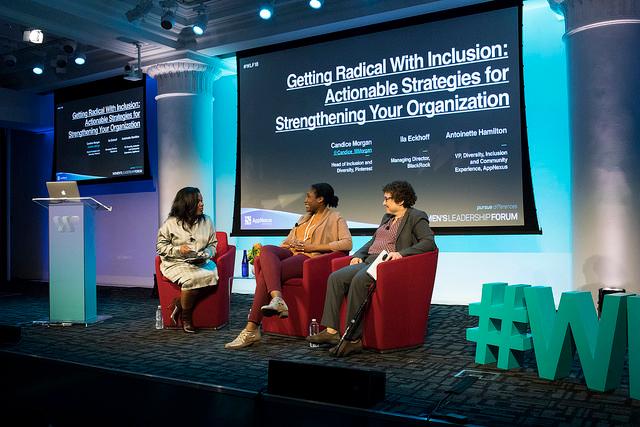
In a conversation titled, Getting Radical With Inclusion: Actionable Strategies for Strengthening Your Organization Candice Morgan, Head of Inclusion and Diversity, Pinterest was joined by Ila Eckhoff, Managing Director, BlackRock and the chat was moderated by Antoinette Hamilton, VP, Diversity and Inclusion, AppNexus. The conversation focused on realistic specific examples of advocating for and creating diverse environments within large established companies.
One key insight is the simple concept that, “it starts with one person…[and it’s okay to] be a little aggressive, Eckhoff shared.
Morgan expressed the importance of not just bringing diverse talent in but making sure the environment for them to succeed and feel included is present. For example often, “women partners feel more isolated when they go to events offsite, and tend to be mistaken as someone’s wife.” That’s not a positive or productive interaction. And she focused on the importance of disrupting the status quo around recruiting and where we look for talent. It’s often through referrals, or certain school networks but she challenges asking questions like “do they have to have that degree?”
“You’re challenging tradition all the time. An example of this is our apprenticeship program. We look for people who do not have a comp science degree. We find people who taught themselves to code or went to coding bootcamps and 90% of those individuals have become software engineers,” Morgan shared.
Adding to the small steps and actions Hamilton points out, “We don’t necessarily have a pipeline problem we have a getting specific problem.”
“Tell your story. Be vulnerable, leading with who you are.” – Antoinette Hamilton, VP, Diversity and Inclusion, AppNexus
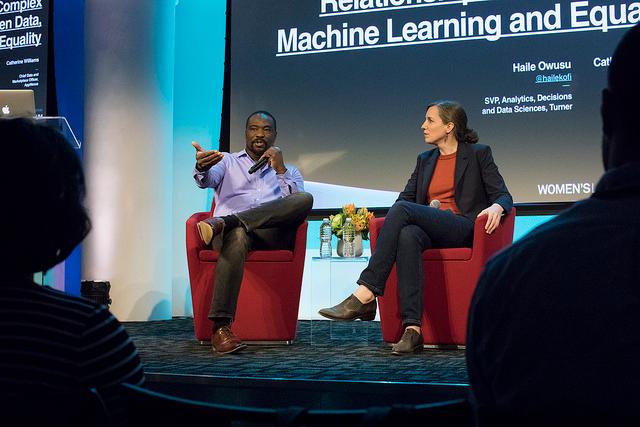
In an compelling conversation on Exploring the Complex Relationship between Data, Machine Learning and Equality Haile Owusu, SVP Analytics, Decisions and Data Sciences, Turner and Catherine Williams, Chief Data and Marketplace Officer, AppNexus shared how algorithm and ethics intersect on a bigger level than just data.
When you hear terms like machine learning, the average consumer likely doesn’t think of the apps and tools we use on a daily basis, or how it informs the foundation of the building blocks of the decision making systems within our society. AI tools like Siri and Alexa use machine learning to predict what you need. Image recognition software uses machine learning and online advertisers use it to predict which users will respond. Popular apps like Amazon and Netflix utilize machine learning within their recommendation engines.
“Machine learning is broad but the simplest explanation for what machine learning is the set of processes by which you teach a computer or an algorithm to generalize from data,” Owusu explains. He shares further that the value of machine learning is that you slot in data in an algorithm of choice and outcomes useful information. In an ideal world it starts to mimic human learning processes.
But it’s not as simple as input output process. As Owusu explains, “the hope is clear but I don’t buy the neutrality. It may be that data is neutral but in order to extract information from the data you have to make choices, you have to impose some structure on the data to extract the info and that process introduces non-neutrality.”
From there the conversation delved into various examples of algorithm’s gone wrong. Owusu recalls a time when Google’s search algorithm associated the term Gorilla with two Black men. This infuriated him, however, his colleagues saw this as just a standard error. Owusu calles it pernicious naïvetè because it’s will fill. The basic problem is the bias in the sample. There’s selection bias in the data, and Owusu said Google agreed with him.
But what is the impact of the misclassification of an image? Williams points to the book “Algorithms of Oppression” by Dr. Noble highlighting the biases of search engines. If there is a bias in the underlying dataset, it gets amplified. An infamous example of this was around the search for the term “Black girls.” This outcome is no longer but as of five years ago, the search term resulted in porn results, and very sexualized non positive associations. If you searched the word beautiful you got a lot of white, heteronormative faces. “It requires an extra focus of the practitioners to say it’s not acceptable those are the wrong answers. Google has got its act together since then. The people involved have to make a focused aware decision,” shared Williams.
“Awareness and attention required from the practitioners,” Williams adds, “Data may be neutral but selecting data is a human activity. Therefore who you choose as data practitioners is hugely important.”
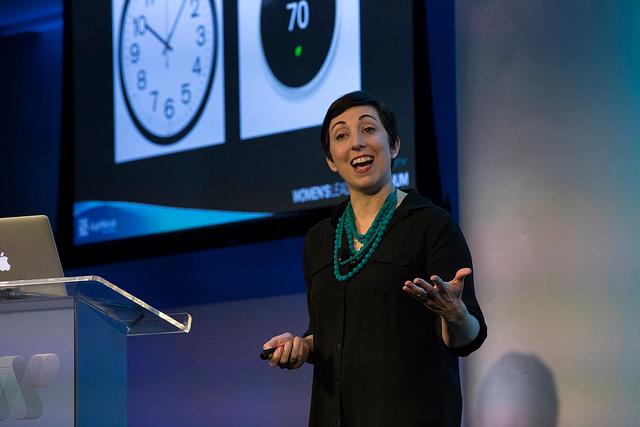
Jessica Lawrence Quinn talks about how we need to “reject, resist, and redesign” our workplaces in her closing keynote titled Prioritizing People In Human-Centered Workplaces. Open office plans are terrible for women, and hurts productivity. And when it comes to the hot desk concept her work has found that “if you don’t have a place at work to call your own you feel like a piece of your humanity has been chipped away.”
We have to keep our humanity in mind around things like speed and productivity. Quinn highlights the fact that tech companies push this idea that fast is better than slow. It’s okay if we want our internet to be fast, but that doesn’t mean that everything should be fast. “The challenge with fast is that it doesn’t allow us to embrace what makes us human,” Quinn adds. Further, she points out that, “Teamwork is not fast. Leadership takes time. Caring for others takes time.”
“Reject the notion that we are stuck with what we’ve got. Let’s get on changing that. Resist defaulting to fast. We are all pushed to move faster and faster but embrace humanity and slow down. It leaves out thoughtful consideration of everyone who should be included. Resist the urge to quantify EVERYTHING. Do I need to describe the ROI having a safe space for having my child while I work all day. We need to Redesign work to embrace our messy, amazing, diverse humanity. What is the point of business if it doesn’t lead to human flourishing?”
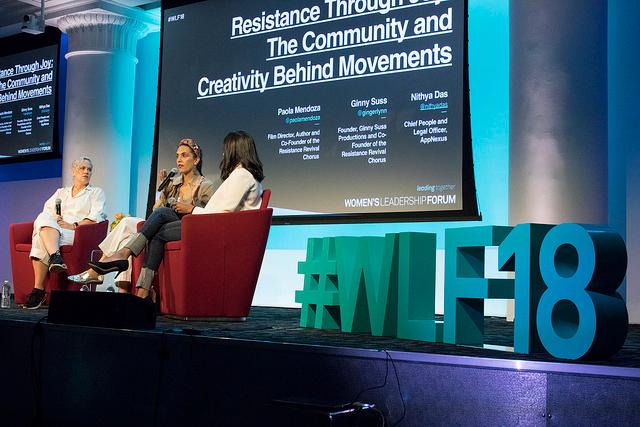
The final conversation Resistance Through Joy: The Community and Creativity Behind Movements brought together Paola Mendoza, Film Director, Author and Co-Founder of the Resistance Revival Chorus, Ginny Suss, Founder, Ginny Suss Productions and Co-Founder of the Resistance Revival Chorus and Nithya Das, Chief People and Legal Officer, AppNexus.
“We got into a space and were able to think outside of the box. What do we want to say when the whole world is watching? And how do we want to say it?” – Paola
The day closed with a powerful performance from the Resistance Revival Chorus. And now it’s up to us to take the baton and keep moving forward.
[This post is sponsored by MWWPR on behalf of AppNexus.]

